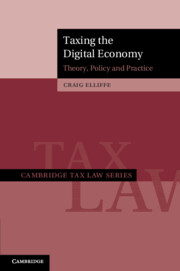Book contents
- Taxing the Digital Economy
- Cambridge Tax Law
- Taxing the Digital Economy
- Copyright page
- Dedication
- Contents
- Figures
- Preface
- Acknowledgements
- Part I
- Part II
- 5 The OECD Secretariat’s and Inclusive Framework’s Proposals for Multilateral Reforms
- 6 Examining the Proposals for Multilateral Reforms
- 7 Implementing the Proposals for Multilateral Reforms
- 8 The Influence of Alternative Policy Strategies on the 2020s Compromise
- 9 Interim Solutions and Long-Term Reforms
- Index
9 - Interim Solutions and Long-Term Reforms
from Part II
Published online by Cambridge University Press: 23 April 2021
- Taxing the Digital Economy
- Cambridge Tax Law
- Taxing the Digital Economy
- Copyright page
- Dedication
- Contents
- Figures
- Preface
- Acknowledgements
- Part I
- Part II
- 5 The OECD Secretariat’s and Inclusive Framework’s Proposals for Multilateral Reforms
- 6 Examining the Proposals for Multilateral Reforms
- 7 Implementing the Proposals for Multilateral Reforms
- 8 The Influence of Alternative Policy Strategies on the 2020s Compromise
- 9 Interim Solutions and Long-Term Reforms
- Index
Summary
This final chapter looks at the alternatives between unilateral digital services taxes and a multilateral consensus on international tax reform. It analyses the key features of digital services taxes and contrasts the advantages and disadvantages against a multilateral solution. Then it goes on to analyse five key future international tax trends that form part of the 2020s compromise and considers the tax implications in the light of the COVID-19 crisis.
- Type
- Chapter
- Information
- Taxing the Digital EconomyTheory, Policy and Practice, pp. 305 - 321Publisher: Cambridge University PressPrint publication year: 2021

